IbuMovement & Susan Hull Walker:
Through her business IbuMovement, Susan Hull Walker is working with some of the finest female craftsmen in the world to bring you fashion and home goods while helping them reach economic self-sufficiency.
IBU pronounced (“EeeBoo”) Movement honors the craftsmanship that women practice around the world. Established in 2015, IBU Movement has a second-floor showroom, office, and studio on Charleston’s tony King Street. It is the evolution of a first business where Walker bought and sold vintage textiles privately into what now is an online emporium of exotic finished goods.
It’s the result of Walker transitioning from being a woman of the cloth to a woman in the cloth. A graduate of Harvard Divinity School and former minister, of 18 years, Walker realized the occupation she loved was no longer enough. After some career counseling, she understood that she needed to explore her creative side.
The Study of Stitching and Looming
Walker began studying fiber arts at Savannah School of Art and Design (SCAD) and plunged into her studies at SCAD – learning how to do everything on textiles from block printing to stitching and appliqué. She says, though, she was never satisfied with the quality of fabric she worked with. One of her professors said she had to learn to weave, and acquiring this skill made Walker think about women in history.
“When I started to loom, I realized that women were sitting in this same place for thousands of years,” Walker recalls. “They were not reading or writing, but this is where they recorded their lives.”
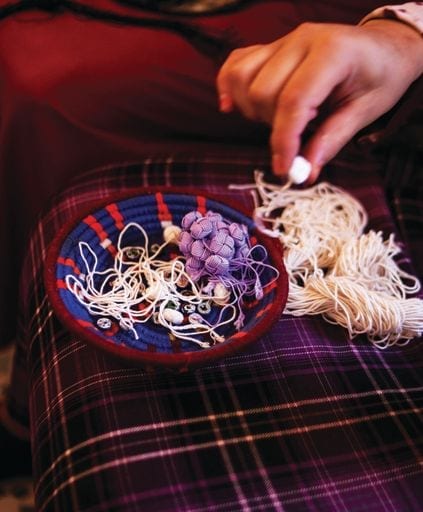
IbuMovement artisans use natural fibers to create extraordinary work with precise skill that was passed from generation to generation.
-
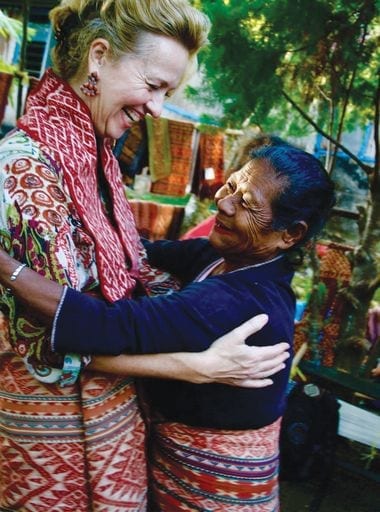
Susan Hull Walker, the founder of IbuMovement, with an artisan in Timor, Indonesia.
IbuMovement: Discovering Hidden Artisanal Weavers
In her early textile trading days after SCAD, Walker began more intensive traveling to find artisanal fabrics at the source. She met the skilled women who either wove or embellished the textiles and knew that in a generation or two, the skills would be gone.
While on a trip in Timor, she stopped at a market and was discouraged seeing little trinkets that women had made for tourists that were clearly “dumbed-down after someone must have told the women how to make things for foreigners.” She later traveled into the forest and met women who were using leaves to create dyes or natural fibers to make fabric.
“They had built a place for women to work; they were sending their children to school and college all while making exquisite things and keeping fine skills alive,” Walker recalls. “As a weaver, I saw these women’s skills far surpass my own. I wanted to find a market for these women to use their skills and get paid for them—let them stay in their villages rather than move to work in a factory.”
Empowering Women Artisans
Her “Aha” moment happened when she knew there was a market in the US where customers would pay a higher price for top-quality artisanal goods. She also felt there was a rising demand for craftsmanship and value placed on provenance. The plan for a company was born.
“The head weaver [in the Timor group] was named Ibu. I learned that the word means: a woman of respect, mother, teacher, leader,” Walker says, in discussing the inspiration for her company’s name. “I hoped the artisans would come to feel that they and their skills are respected. When you pay women to do what they have known to do all along, it changes everything . . . and their status in their community. To men, their work was just considered household responsibility. I love that they are now getting valued for what they have been doing all along.”
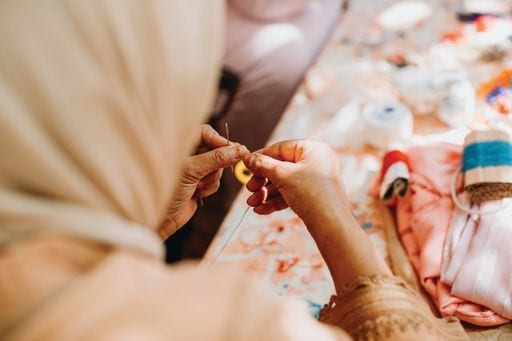
The delicate work of artisans in Ourika, Morocco, who weave, stitch and embellish textiles. “As a weaver, I saw these women’s skills far surpass my own,” says Walker.
From Fabrics to Fashion Lines
IbuMovement soon expanded out of textiles into finished goods developed and/or curated by Walker and a small design team. They introduced the “World Dress” in an A-line cut that flatters just about everyone, and a jacket, both of which used fabrics or embellishment techniques from 24 different groups.
She called on Ali MacGraw, a friend from Santa Fe where Walker has a home, to be a brand ambassador and to create a capsule collection, dubbed Ali4Ibu, of fashion items for Spring 2017 and for Spring 2018. MacGraw’s latest collection will bow later this spring.
For Fall 2017, Walker tapped renowned interior designer and Ibu ambassador Charlotte Moss for a collection. Grand dame and fashion icon Iris Apfel is also a brand ambassador, among a few others.
Apfel, who started the Old World Weavers textile house in the 1950s with her husband featuring decorative fabrics based on historical techniques and designs, has a love of fabrics and was introduced to Walker via mutual friends. Ibu has two beaded clutches featuring Apfel’s likeness for $250 each.
Developing Friendships and Collabs
MacGraw says she’s honored to be a part of Ibu. She met Walker after seeing her nose around the annual International Folk Art Market/Santa Fe—an event that compelled Walker to lay down some roots in that city. Their shared passion for ethnic goods and drive to do work that benefits others helped seal their friendship and collaboration at Ibu.
MacGraw was also happy that her involvement created publicity for Ibu thanks to the many press articles that discussed her collection.
“I have collected ethnic textiles and jewelry for decades, and both of my parents were artists who made jewelry, weaving, enamel work and printed textiles: I have been drawn to these arts my whole life. Additionally, my first job after college was as assistant to the legendary Fashion Editor, Diana Vreeland, and after that (and before my film career) I was the Stylist for the top fashion photographer, Melvin Sokolsky,” MacGraw recounts. “I have been exposed to the very highest talents in the fashion industry, and so the idea of helping to create some special pieces for Ibu, using the incredible sources Susan had already found appealed to me enormously. As a woman who knows that the artisans and women in general in many of these faraway lands are generally underpaid, under-respected, and massively talented, I was immediately drawn to Susan’s wonderful plan to reach out to them and try to make a difference in their lives.”
For her summer range, MacGraw says she’s planning on kaftans, skirts, and some tops, “what I think of when I imagine comfortable and beautiful clothing for women for Summertime. She will also come up with designs for unusual jewelry.
Growing the Mission of IbuMovement
Ibu Movement now works with 126 female artisan groups across 40 countries. Clothing includes embroidered tunics, hand-block printed caftans and other separates, but the most stand-out items are the coats, notably the hand-embroidered pieces that take over two months to complete and cost $2,495.
Jewelry includes everything from $20 woven bracelets from Columbia, bestsellers, to a $295 silver cuff bracelet from Mexico. Goodies for the home include a set of four cocktail napkins in fabric with embroidered mirrors from Afghanistan for $55 to woven leather throw pillows for $385.
Walker and her team do not impose Western “style” on Ibu’s manufacturing partners; the few changes they might request generally revolve around sizing, proposing clothing patterns that corresponded to Western bodies, or color suggestions to make sure the palette appeals to Western taste. Currently, she is working to introduce more neutral colors and increase the number of tailored fashion pieces.

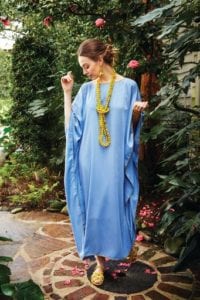
Model wearing an IbuMovement blue silk and cotton hand-embroidered caftan, from Morocco, with jewelry from Colombia, including an African glass bead necklace, that was handstrung in Charleston, and 24-karat gold covered orchid earrings with unpolished emerald stone
“What I do now seems to me a continuation of my ministry—elevating women and celebrating their brilliance which often is overlooked,” Walker observes.
IbuMovement is a for-profit business. Walker says it’s critical for women to learn how to place their skill set into a business model to be economically self-sufficient, whether it be by setting up local credit unions or quality control systems. Fashion and home goods are hard businesses, and Walker wants her artisan groups to be around after she’s “long gone.”
Providing Artisans the Tools They Need
In the past year, Walker started the nonprofit weareibu.org, a 501(c) (3) foundation, after realizing that some IbuMovement suppliers needed extra resources for production. For example, a group from Nigeria supplying excellent embroidery started to get late with deliveries.
Walker learned that they needed lights to work late in the day. The non-profit, financed by donations which reached $280,000 in the first nine months, helps to cover the costs of these kinds of obstacles that prevent an artisan group from starting to work, or stop them in their tracks, among other initiatives.
“We’re not in it for the money,” says Walker, adding that she hopes this fifth year of business will break-even. “The IbuMovement business gives the artisans work, and the non-profit gives them the tools so that their design and business training can be profitable. It’s a hand-in-hand for-profit and non-profit endeavor.”
IbuMovement: Staying Fresh
To keep Ibu’s assortment fresh, Walker scours the globe to find artisanal craftswomen. She came upon the group in Timor during a textile trip organized out of Bali. Because she studied textiles and is “in the field,” she learns about groups by word of mouth. She also hires local experts to take her through their geographic area.
Walker loves to stake out the International Folk Art Market/Santa Fe, an annual event which drew Walker to buy a home in Santa Fe. Here, she sniffs out skills, not products, in the hopes of finding a resource that will do custom work.
Ibu has several requirements for suppliers: Someone has to speak English, someone has to be able to communicate by email, and the group should have a beading, embellishment or other textile tradition that’s at stake and needs to be preserved
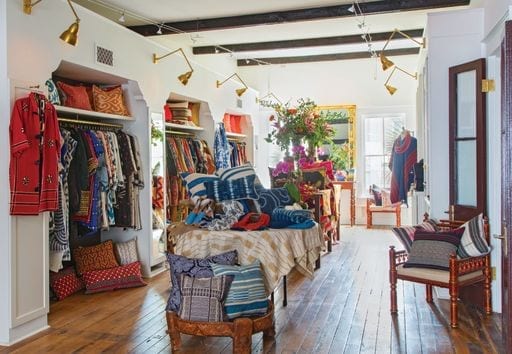
The IbuMovement store, located on King Street in Charleston, S.C., offers a showroom full of original designs that are elegant, bold, powerful and all handmade
These days, Walker is particularly excited about female artisan groups in Colombia where young designers in Medellin are working with indigenous tribes making new items she’s never seen before; in Ethiopia, a country she loves for its diverse geography, where she sources towels and caftans made from some of the “softest cotton”; and Afghanistan, where she works with incredibly talented women who are likely surrounded by men in the Taliban.
“These are the women that keep me inspired,” Walker says.
By Katie Weisman
Editor’s note: Shop IbuMovement on Sara Hull Walker’s website.

